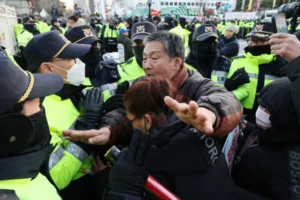In a surprise late-night address on Tuesday, South Korea’s President Yoon Suk-yeol announced the imposition of martial law, citing a motion by the main opposition Democratic Party, which holds a parliamentary majority, to impeach top prosecutors and reject a government budget proposal.
But less than two hours after the martial law declaration, lawmakers forced their way past soldiers to vote to strike down his decree. Yoon accepted the reversal six hours later.
What happened in South Korea on Tuesday?
In an unscheduled televised address at about 11pm (14:00 GMT), Yoon declared martial law, accusing the Democratic Party of sympathising with North Korea and engaging in antistate activities.
His decree briefly handed control to the military, deploying troops and police to the National Assembly building, where helicopters were spotted landing on the roof.
South Korean politicians swiftly condemned Yoon’s declaration as illegal and unconstitutional. Opposition leader Lee Jae-myung urged Democratic Party MPs to gather and vote to reject the declaration.
Thousands took to the streets, but tensions did not give way to violence despite the military presence. Lawmakers managed to bypass the barricades, and when they arrived at the chamber, they unanimously voted to block the decree during an emergency late-night session, with 190 of South Korea’s 300 National Assembly members present.
At about 4:30am (19:30 GMT), Yoon said he would reverse his decision. He confirmed in a statement that the troops sent to carry out the order would be withdrawn, but he repeated his original justification for the decree.

What is martial law?
Martial law is a temporary form of governance by military authorities during emergencies.
South Korea’s constitution states that the president can declare martial law when necessary to address a military threat or maintain public safety and order by deploying military forces.
According to the Center for Strategies and International Studies (CSIS), Yoon invoked emergency martial law.
By declaring emergency martial law, Yoon has the authority to “[limit] freedom of speech, publication, assembly, and association,” according to the CSIS.
In this instance, the order placed all media outlets under martial law control and instructed all medical personnel, including striking doctors, to resume work within 48 hours.
Thousands of doctors have been on strike in South Korea since early February over a proposal to increase medical school admissions, forcing hospitals to cancel treatments and surgeries. The government says the reforms are needed to alleviate staff shortages and manage the country’s transition to an ageing society.


